Ryobi power tools seem to be everywhere – it’s a favorite brand of homeowners and DIYers (including me!), and the signature green/yellow is hard not to see it in nearly every home/DIY influencer’s Instagram posts. But why is Ryobi so popular? Why is this specific brand of power tools seemingly everywhere?
Ryobi is popular because it balances price and reliability, and the brand sells a huge range of products. The power tools are especially popular because of the 18V One+ battery system – allowing a DIYer to use one battery for hundreds of different tools.
But that’s not the whole story. If you’re thinking of starting or streamlining a cordless power tool collection, you’ll want to know all the ins and outs before you invest hundreds of dollars in a brand. Below, I’ll cover where Ryobi tools are sold, whether they’re geared towards DIYers or professional contractors, what kind of products Ryobi sells, their longevity and reliability, who owns Ryobi, and how Ryobi compares to other brands.
Table of Contents
- Where Are Ryobi Tools Sold?
- Is Ryobi Geared Towards DIYers or Professional Contractors?
- What Kinds Of Products Does Ryobi Sell?
- What Does The DIY Community Think of Ryobi Tools?
- Longevity and Reliability
- Who Owns Ryobi?
- Where Are Ryobi Tools Made?
- How Does Ryobi Compare To Other Brands?
Where Are Ryobi Tools Sold?
Ryobi tools are sold exclusively at The Home Depot, so if you’re thinking of buying into the brand, you’ll want to make sure a Home Depot is close by. There are resellers on Amazon, but they are not first-party so your mileage may vary.
I’ve found that close to new launches, stock can be hard to come by in-store at Home Depot, so it’s always good to order ahead. The same can be said if you are looking for a specific tool – many, many tools are sold each day, and often things get moved around. I’ve never regretted opting for curbside pickup, especially with little ones in tow.
Many people assume that since Ryobi is a Home Depot exclusive brand that Ryobi is Home Depot’s in-house line of power tools. In reality, Husky and HDX are Home Depot’s in-house brands, and Ryobi is just sold there.
Is Ryobi Geared Towards DIYers or Professional Contractors?
Generally, Ryobi is marketed towards the DIYer or homeowner, but some professionals use Ryobi tools as well thanks to their massive variety of products, warranties, and fair prices. That being said, most contractors that have come to work in my home are using Ryobi for specialty tools, and not their ‘bread and butter’ drills and such.
Ryobi is plenty rugged and durable for a homeowner or casual DIYer – I’m certainly not gentle with my tools, and every single one of my Ryobi products (save for a sander that was overused – more on that later) has stood the test of time.
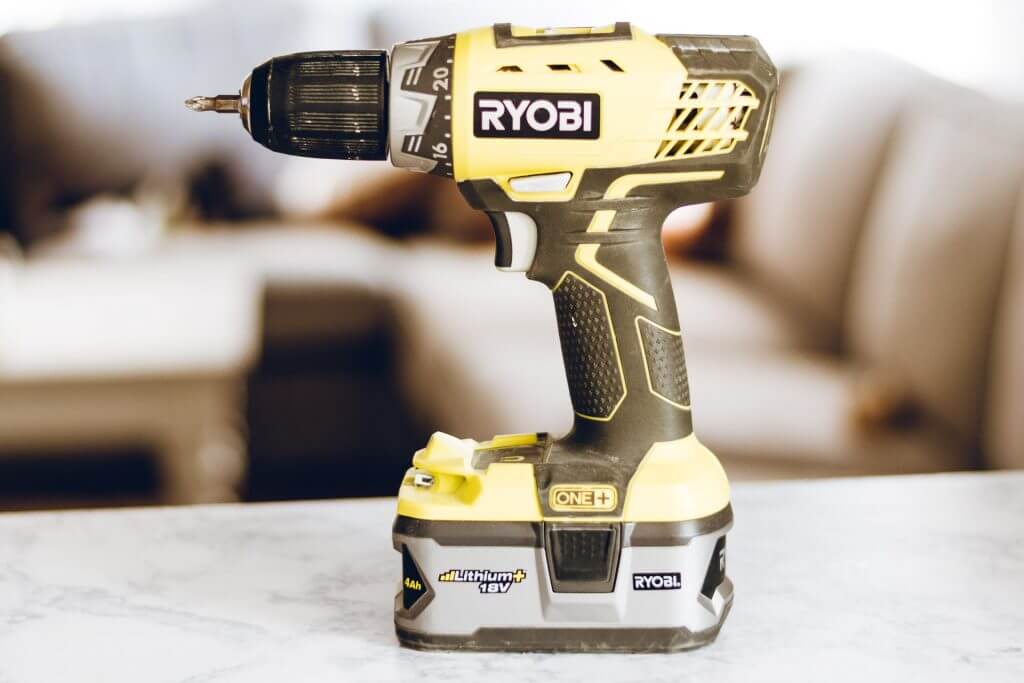
What Kinds Of Products Does Ryobi Sell?
Basically, if you can think of it, Ryobi sells it. They even have electric glue guns. You won’t be wishing they made a particular tool – pretty much everything is available.
One of my favorite things about Ryobi is the versatility of the batteries – they can be used with hundreds of tools and accessories. It’s actually one of the reasons I chose to invest in Ryobi in the first place. Batteries are one of the most expensive parts of owning cordless tools, and not having to purchase multiple kinds keeps costs down.
Cordless Power Tools (18V One+ Line)
The Ryobi 18V One+ Cordless line (what most of my tools are) includes over 225 tools that can all be powered by the same battery, from drills to saws, and much more. I started with the 18-Volt ONE+ 6-Tool Combo Kit, but have bought many, many tools from Ryobi since then.
Within the 18V One+ line are brushless tools – think of them as a premium version with more specific and advanced build quality and techniques. They’re more expensive but should last longer. I tend to only jump for the brushless when it’s a tool I know I’m going to be using a LOT.
Ryobi offers tools in the following categories in their 18V One+ system, but is always adding more!
- Audio and Entertainment
- Benchtop and Stationary Tools
- Blowers
- Chainsaws
- Cleaning Tools
- Drills and Drivers
- Hedge Trimmers and Other Trimmers
- Inflators and Compressors
- Lighting
- Metalworking Tools
- Misters
- Mowers
- Nailers and Staplers
- Plumbing Tools
- Pressure Washers
- Specialty Tools
- Sprayers
- Vacuums
- Woodworking Tools
Cordless Power Tools (40V Cordless Line)
Ryobi recently came out with a more powerful tool line – 40V cordless. These are your blowers, chain saws, hedge trimmers, etc. They even have lawnmowers.
I actually purchased a different outdoor tools line (that I’ve been incredibly unhappy with) before Ryobi offered many outdoor tools…but I will upgrade to their outdoor tools someday! Ryobi offers tools in the following categories in their 40V system:
- Blowers
- Chain Saws
- Generators and Power
- Hedge Trimmers and Other Trimmers
- Mowers
- Snow Blowers
Corded Power Tools
If you’re looking for a great tool at a lower cost, Ryobi also has a great selection of corded tools. My first miter saw was a corded Ryobi model, and it was the sole reason we were able to lay over 1,000 square feet of flooring ourselves. My table saw is another corded tool from Ryobi that I’ve been incredibly happy with.
What Does The DIY Community Think of Ryobi Tools?
In researching this article, I knew I wanted to come at it from more than just my perspective. While I’ve owned Ryobi tools for 7 years now, my experience alone is not enough to judge a brand by. I came across some of the following sentiments during my research:
- Good tools at a good price, but I wouldn’t count on them if they were my livelihood
- Great periodic sales – easy to pick up a bunch of tools at once
- Wonderful for both DIYers and when you go camping – no need to buy separate batteries!
- Love that the new batteries work in the old tools
- The batteries hold a charge really well
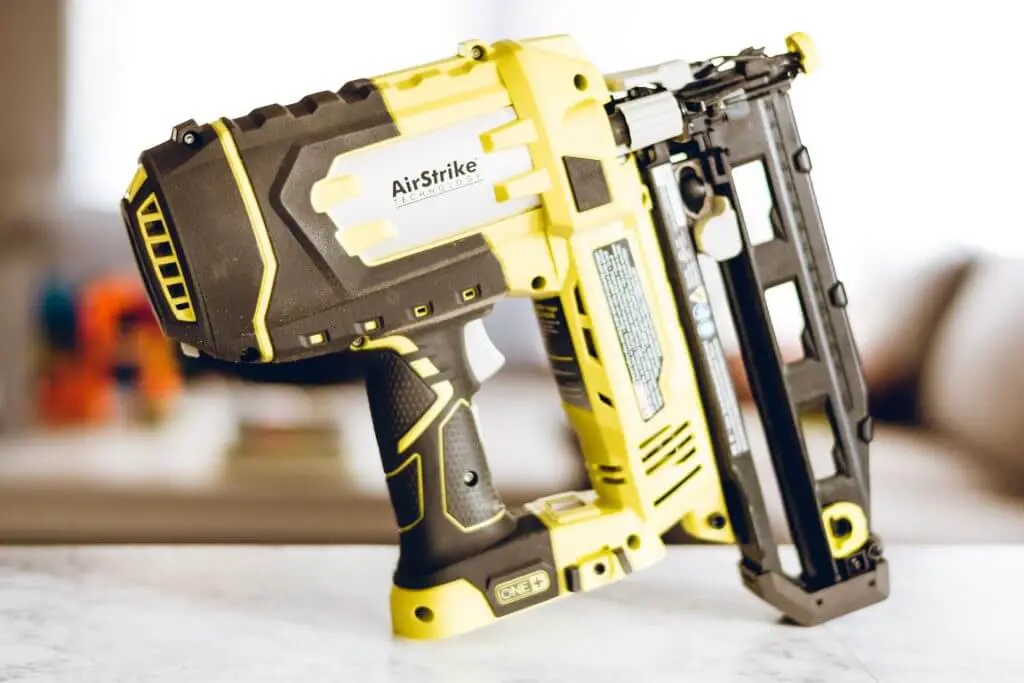
Longevity and Reliability
How Long Do Ryobi Tools Last?
I’ve owned dozens of Ryobi tools, and have only had one break on me…and only after an intense torture test.
The half bathroom at our first house was wallpaper, covered with faux plaster/textured sponge paint (done with drywall mud), and was a HUGE project to sand down. My mom was kind enough to sand every inch of that room while I was working on other things (it’s a half bath…there’s only room for one person!). I’d say she was probably sanding for 8+ hours pretty much continuously before the tool finally gave out – it had just been too hot for too long. For $40, I certainly think I got my money’s worth.
(Seriously, if you haven’t seen that transformation yet…click here. It’s worth it – and kind of unbelievable)
Everyone I know that owns Ryobi tools loves them, and in general, they aren’t prone to breaking. That being said…they are not super high-end tools meant to last generations.
With regular usage, Ryobi batteries are generally considered to last about a year, but my collection has been going much longer than that. In fact, I bought my first Ryobi battery back in 2016, have since continued to add to my collection, and have only lost one battery so far.
Even better, Ryobi recently upgraded their warranty on batteries from one year to three years, which is great news. Keep those receipts!
What Are The Warranties Like For Ryobi Products?
18V One+ Products
All Ryobi 18V One+ Portable Power Tools, Bench/Stationary, Outdoor Power Equipment, Batteries and Chargers are covered by a 3-year limited warranty. I’ve never gone through a warranty replacement, but the general consensus online is that Ryobi is quite good at honoring the warranty.
40V Products
All Ryobi 40V Lithium-Ion Outdoor Tools are covered by a 5-year limited warranty, and all RYOBI 40V Lithium-Ion Outdoor Batteries and Chargers are covered by a 3-Year Limited Warranty.
Hand Tools
This Limited Lifetime Warranty applies to RYOBI Tape measures, Hammers, Shovels, etc.
Overall Warranties
Techtronic Industries agrees to repair or replace any defective product free of charge up to three years (if the product was used for personal, family, or household use) or 30 days (if the product was used for any other purpose, such as commercial or rental).
Their warranties do not cover any product that has been subject to misuse, neglect, negligence, or accident, or that has been operated in any way contrary to the operating instructions. The warranty does not apply to any damage to the product that is the result of improper maintenance or to any product that has been altered or modified. The warranty does not cover normal wear and tear on the product.
Certain products like auto accessories and outdoor lawn equipment accessories are not covered under warranty, so make sure you check the warranty for whatever specific item you are looking for before purchasing.
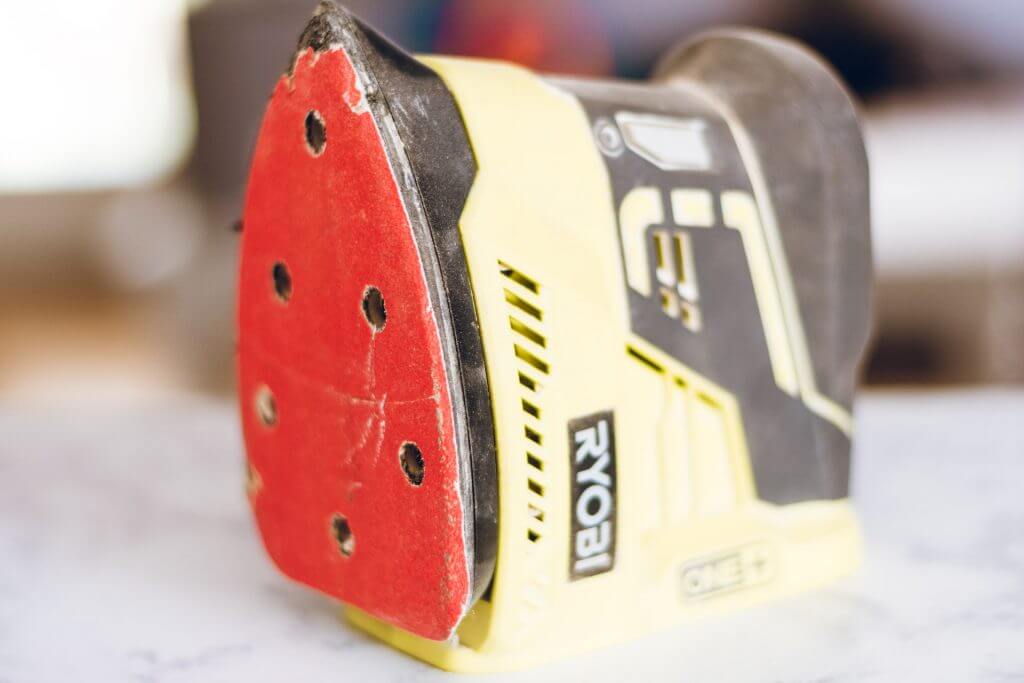
Who Owns Ryobi?
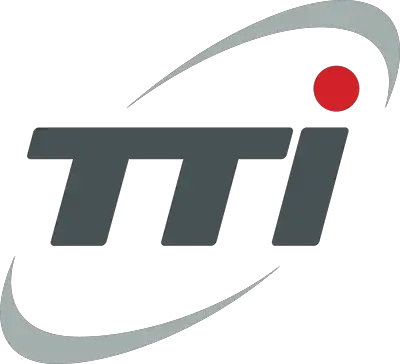
Techtronic Industries (TTI) is the parent company of Ryobi, which also owns:
- Milwaukee
- AEG
- Homelite
- Empire
- Imperial Blades
- Stiletto
- Hart
- Hoover
- Oreck
- Vax
- Dirt Devil
This massive group of brands is actually pretty common in the tool market – many people just don’t know that they’re all part of one huge corporation. So, if you’ve heard certain things about Milwaukee, and other things about Ryobi, take each with a grain of salt – both ultimately answer to the same powers.
Where Are Ryobi Tools Made?
Finding actual manufacturing data was pretty hard, but as near as I can tell, most Ryobi tools are made in China, with some being assembled in Indiana. In other words, Ryobi is not an American-made brand. The trade-off for lower prices is that the tools are assembled in China – but that’s something nearly every brand is facing these days.
How Does Ryobi Compare To Other Brands?
If you only want to use one tool brand, and you earn your living with your tools, it’s probably smart to invest in another more pro-focused brand. But if you are a homeowner, renter, or DIY enthusiast like me, Ryobi is a great brand. To learn more, I’ve compared most of the major brands below.
| Price | Power Level | ||
| Ryobi | Less Expensive | 18V, 40V | |
| Black and Decker | Less Expensive | 20V | |
| Bosch | More Expensive | 12V, 18V, and 36V | |
| Craftsman | More Expensive | 20V | |
| DeWalt | More Expensive | 20V | |
| Kobalt | Middle of the Road | 20V and 24V | |
| Makita | Middle of the Road | 12V, 18V, 36V, 40V, 80V | |
| Milwaukee | Less Expensive | 12V, 18V |
Ryobi VS Black & Decker
Black and Decker (now Stanley Black and Decker as of 2010), is part of the same company that owns Craftsman, DeWalt, and many others. Both Black and Decker and Ryobi produce their tools primarily in China, and they are very competitive in price. The general consensus is that Ryobi will give you higher quality tools with much better warranties, and a better overall product selection, too.
Take all of this with a grain of salt – I’ve never owned a Black & Decker tool, but I’ve been so happy with Ryobi that I’ve never needed to.
Ryobi VS Bosch
Both Bosch and Ryobi offer quality tools at good prices, and typically market their products toward homeowners and DIYers, but Ryobi definitely takes the lead in terms of warranties. They both offer a ton of different power tools, though Ryobi has more in terms of outdoor equipment for lawn and garden.
I own a Bosch miter saw (not cordless, though still relevent), and I’ve been incredibly happy with it – it runs like a dream…but it was also incredibly expensive. Bosch tends to be known as higher quality, but for most of us DIYers, Ryobi is plenty of tool. I used a Ryobi miter saw for years and years, and it did the job very well.
Ryobi VS Craftsman
Both Ryobi and Craftsman manufacture mid-grade tools at mid-level prices. Ryobi offers better warranties on power tools, but Craftsman offers great warranties on mechanic tools, hand tools, and more. Craftsman manufactures a more diverse line of products in terms of automotive tools, outdoor equipment, and storage gear, while Ryobi has a larger and more varied selection of tools across a bunch of different industries.
Ryobi VS DeWalt
Overall, DeWalt offers better warranties across the board than Ryobi. DeWalt also produces a wider range of products, including things like work gear, clothing, and hand tools, that Ryobi doesn’t produce as much of. Ryobi does produce a lot more outdoor equipment than DeWalt. DeWalt’s products are generally higher quality with a higher price to match.
Many people in my family absolutely LOVE DeWalt, and I can see why – they’re a fantastic brand. That being said, I tend to only upgrade to DeWalt when it’s a heavy-duty, mission-critical kind of tool – like a hammer drill. And even then, I go with the corded model for more power. Otherwise, Ryobi is plenty for me!
Ryobi VS Kobalt
Both Kobalt and Ryobi are reputed for their quality products with great warranties for their power tools. The comparison really depends on what you are looking for – anecdotally, I’ve had far more trouble with Kobalt tools than I have with Ryobi. That’s just one person’s opinion though, so take it with a grain of salt!
Ryobi VS Makita
Makita offers higher quality products with warranties comparable to Ryobi’s at a higher price point, with the difference in these products lying in their quality and target market. DIYers and homeowners will likely find they can get all they need with Ryobi tools, while professionals may wish to choose the higher-end Makita tools. If your livelihood depends on your tools, Makita is a great brand, but if you’re just casually using them, Ryobi is the way to go.
Ryobi VS Milwaukee
Both Ryobi and Milwaukee are owned by parent company Techtronic Industries. Milwaukee products, in particular their cordless products, are known to have very long runtimes, high levels of durability, and a wide variety of features. Milwaukee tools are great for professionals who need reliable and high-quality tools for heavy-duty, daily use. Ryobi is more suited for homeowners and DIYers who are looking for a more affordable option.

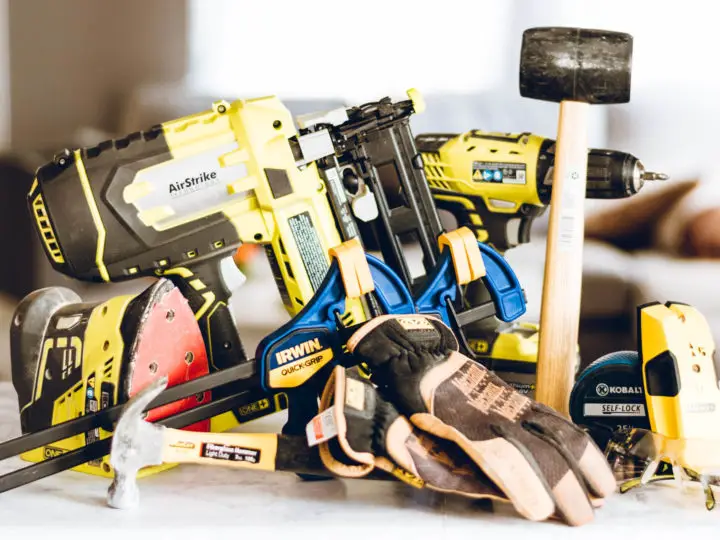
Stefan
Friday 2nd of December 2022
Thank you for the great article. I am DIYs and standardize on Bosch ProFactor tools (or the 'blue' line (opposed to the 'green' line, that is also blue in the US but can be identified by more plastic parts) as they are known in Europe). Cost is not so much a factor for me as I compare with what the job would cost me when outsourced to a contractor, and every single tool has had ROI of several 100%s. I started out as a new home owner many years ago with Dewalt where I still have 20+ year old tools that hum away, and mitigate with Makita or some rare brands like Mafell, Delta, etc for what Bosch does not have for the job that I do. I own two Ryobi tools for innovative speciality applications. I find Ryobi a bit flimsy and bulky when compared to Bosch, but they work, and are cheap if bought on a sale. My family loves Festool, which are way too expensive for me, and I question that ROI on the repair and improvement jobs that at least I do around the house, but people appear very happy with them who own them. I never got into the Festool universe, bc not just the tools are expensive but also the accessories. With brands like Mafell I can use price effective Bosch accessories, bc they licensed some tech from Mafell, just as they appear compatible with Fein - and sometimes I care more about the accessories and quality of bits, as I do not want to deal with BS as a less experienced DIYs.
Roger
Tuesday 20th of September 2022
I won my first Ryobi rechargeable drill in a plumbers merchant raffle possibly 15yrs ago, it still works perfectly although a little battered. I have recently bought another in case for some reason they become unavailable. Need I say more !!!!